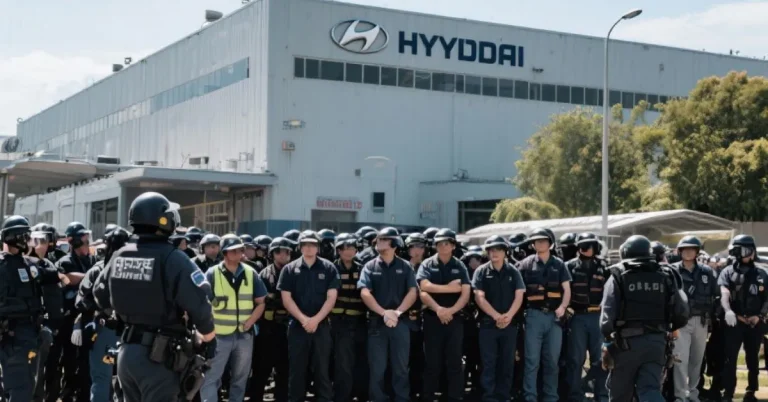South Korea has secured the release of over 300 of its nationals detained in a massive U.S. Immigration and Customs Enforcement (ICE) raid at a Hyundai electric vehicle plant in Ellabell, Georgia, on September 4, 2025. The South Korean government announced plans to send a chartered plane to bring the workers home once administrative steps are finalized, following swift negotiations with U.S. authorities.
The raid, described by ICE as the largest single-site enforcement operation in Homeland Security Investigations history, targeted a joint Hyundai Motor Group and LG Energy Solution facility. Federal agents detained 475 workers suspected of illegal employment, with most identified as South Korean nationals. The operation has sparked diplomatic tensions and raised questions about labor practices at the high-profile project, touted as Georgia’s largest economic development initiative.
Unprecedented Raid Shocks Seoul
On Thursday, hundreds of federal agents descended on the Hyundai plant, where workers were seen being handcuffed and shackled in footage released by ICE. “We are deeply concerned and feel a heavy sense of responsibility over the arrests of our nationals,” South Korea’s Foreign Minister Cho Hyun said at an emergency meeting in Seoul, according to Yonhap News Agency.
South Korean Presidential Chief of Staff Kang Hoon-sik confirmed on Sunday that negotiations with the U.S. had concluded successfully. “We’ve finalized the release of over 300 workers, and a chartered plane will bring them home as soon as possible,” Kang stated, emphasizing the government’s commitment to protecting its citizens abroad.
Context of the Raid
The Hyundai-LG plant, under construction near Savannah, is a flagship project for electric vehicle battery production. The raid followed a months-long investigation into labor practices, with ICE alleging widespread illegal hiring among subcontractors. Steven Schrank, Special Agent in Charge for Homeland Security Investigations in Georgia, noted that many detainees worked for various companies at the site, not directly for Hyundai.
The operation has drawn criticism for its scale and timing, coming weeks after South Korea pledged significant investments in the U.S. “This raid risks undermining major bilateral economic commitments,” said Kim Joon-hyung, a Seoul-based international relations expert. He added, “It sends a conflicting message about U.S.-South Korea economic cooperation.”
Diplomatic and Economic Fallout
South Korea, a key U.S. ally, expressed shock at the detentions, particularly as they followed President Lee Jae Myung’s recent summit with U.S. leaders. Posts on X reflected public frustration, with one user, @KoreaObserver, stating, “South Korea’s investment in U.S. jobs deserves respect, not mass arrests.”
Hyundai issued a statement clarifying that it was cooperating fully with authorities and reviewing its subcontractor practices. Meanwhile, the U.S. Department of Homeland Security has not commented on the specifics of the release agreement, directing inquiries to ongoing administrative processes.
Next Steps for Repatriation
South Korea’s government is prioritizing the swift return of the detained workers. Foreign Minister Cho Hyun is reportedly considering a trip to the U.S. to discuss the incident with the Trump administration, signaling the issue’s diplomatic weight.
As the repatriation process unfolds, the raid has spotlighted the complexities of multinational labor practices and immigration enforcement. “This is a wake-up call for global companies to ensure compliance with local laws,” said labor analyst Park Soo-jin in Seoul. “But it also highlights the need for clearer U.S. policies on foreign workers in strategic industries.”







